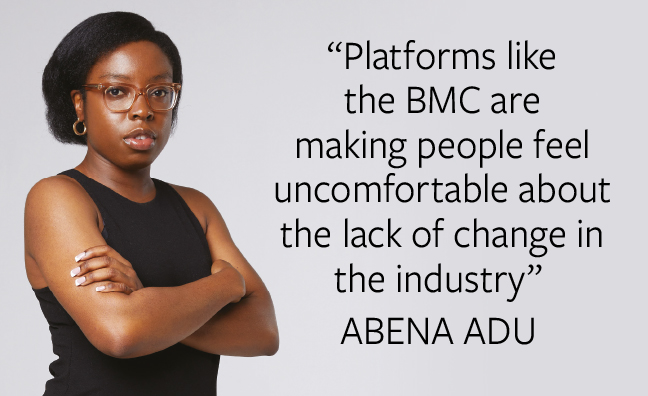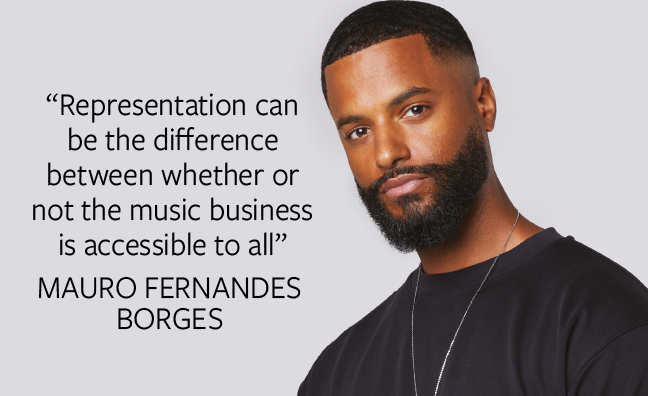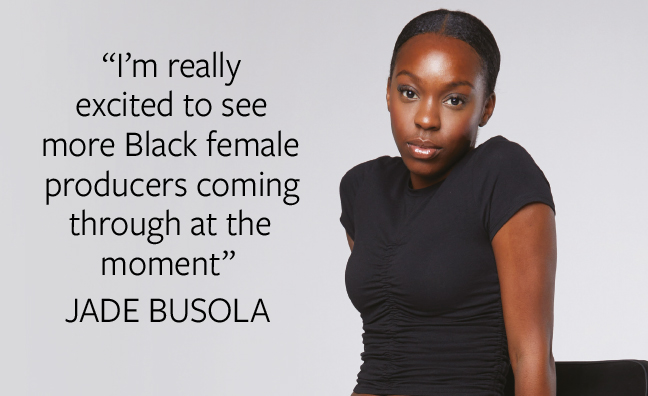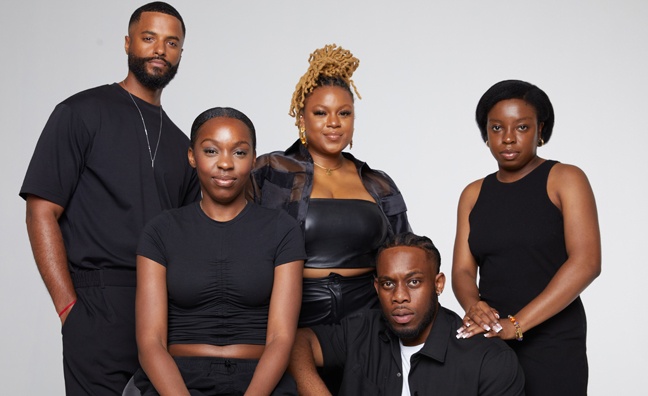Since forming in 2020, the Black Music Coalition has been a force for change in the industry. Its annual Excellence Honourees list shines a light on the next generation of executives. Here, we meet five of this year’s new members…
PHOTOS: CALVIN CEILE
ABENA ADU – Founder, The WFA Agency
You worked at Spotify among other places before becoming a manager. How would you describe your path into the music industry?
“I would describe it as non-linear. I came into the industry after doing an MA in music business management. You don’t need a degree to get into music, but I didn’t have the connections so I used it as an opportunity to network too. I did various internships and junior roles including at Spotify and Q&A [now Venice Music]. I learned that I’m quite a risk-taker as I quit my previous job outside music to do my initial internship at Spotify and go back to uni, not knowing what I would do after my placement ended. But my contract at Spotify was extended and allowed me to continue to grow and learn about the world of streaming. That’s where I cemented the idea that I wanted to work more closely with artists and be a part of their career development.”
What drove you to form your own agency?
“I’ll have to cast my mind back to the depths of lockdown in the UK in 2020. I was about to finish uni and job prospects looked bleak. So while looking for a job, I built my own business at the same time. It has taken a lot of determination but it worked. I would say finding the right talent to work with and knowing my skill set have been key, I believed in myself to execute at a high level and feel blessed to be working with such talented artists as SuperJazzClub and 95Antny.”

Can you name the qualities that define your work as a manager?
“You have to really believe in your artists. So much goes into helping to develop them, especially if you meet at the start of their career. Another quality is problem solving. You have to always keep a level head so that any stress is not transferred to the artist. No matter if everything has gone wrong, you have to find a way through it. Your primary reason cannot be money because that clouds judgement; you have to love what you do.”
What is the biggest challenge you’ve faced so far?
“Getting my foot in the door. It was so hard and I don’t think enough people talk about it. I didn’t have the experience and no one wanted to hire me without that, so I created my own experience through my blog, WithoutFurtherAdu. That helped me get my first internship, which then gave me the idea to start The WFA Agency.”
And now you’ve been recognised by the Black Music Coalition [BMC]. What does that mean to you?
“It means a lot because they are actively holding traditional institutions to account. They’re really not changing fast enough or allowing young execs to have power or even truly believe in themselves. They’re more interested in maintaining how things have worked until now. But they’ll soon learn or be left behind. I hope it’s the former.”
Do you feel supported enough as a Black executive in the UK industry?
“I feel more supported by a small community, especially my network of Black female execs, than the wider industry. It’s a difficult place to navigate as a lot of networking feels transactional, so it’s hard to discern at times who genuinely cares about your growth and who just wants to be close to you. How can you truly ever feel supported in a space that thrives on that?”
Is the industry focusing hard enough on the fight to eradicate racism?
“In a word, no. But platforms like the BMC are making people feel uncomfortable about the lack of meaningful change. This was exemplified by their open letter earlier this year, which said, ‘As Black music and culture continue to provide joy and wealth to many non-Black people, it is evident that proximity to Blackness continues to offer those who act contemptuously towards it a redemption arc.’ How can the industry claim to be doing anything more than just lip service when we’re all aware of why such a letter was written in the first place?”
Do you feel part of a wave that will lay the foundations for generations to come?
“Being recognised by the BMC is amazing because I feel like we bring a fresh energy to the industry. We’ve grown up with a different perspective and as such we’re not colouring within the lines and we are unapologetic about doing so. This will definitely encourage those coming up to see a path to how to [be part of] what we’re doing and working towards.”
MAURO FERNANDES BORGES – Creative Lead, EMI/Universal Music UK
What’s the best thing about your job?
“Being able to connect and collaborate with creatives from around the world. There is such an abundance of incredible creatives just an idea or brief away. Also, finding new emerging talent is one of the most enjoyable aspects of what I do. There’s a young kid somewhere creating phenomenal art just waiting to be discovered. It’s rewarding to be able to see an idea from an artist or a team right from conceptualisation all the way through to production. Seeing a simple idea or concept manifest through the collaborative process is what drives so much of my day-to-day.”
Is the music industry everything you thought it would be?
“Prior to working at a major record label, I had little to no expectations as to what it would be like. I didn’t know my job within the industry existed until I was blessed with the opportunity to create that space for myself. From creating artwork in my bedroom or on days off from my retail job, I never thought it would translate to working with some of the biggest global acts. If I said I knew what to expect I’d be lying, because a part of me is still in disbelief.”

Are there any misconceptions about the industry, or your particular area within it, that you feel need to be corrected?
“Unlike some fields outside of music, working within the creative teams at a record label doesn’t necessarily require you to have a vast experience or history of previous work. Yes, education and knowledge are important, but neither of those are strictly only obtainable from a classroom or course. Being self-taught and having the desire to develop your potential in unconventional ways can also land you in places you wouldn’t otherwise think possible.”
Why is it important that the BMC exists?
“Without it, we wouldn’t have such a proactive approach to supporting and spotlighting Black execs and talent from across the industry. The BMC has set a foundation that continues to enrich and educate a diverse group of backgrounds, while being inclusive and transparent. Being able to share my experience with the support of the BMC is something I’m incredibly proud of and I’m blessed to have the opportunity. I know my voice could inspire those from a similar background to myself.”
How do you feel being honoured by the BMC will boost your career?
“It’s less about the career boost and more about self-growth. Being recognised by the BMC is truly a big enough honour for me. The biggest boost would be to showcase to others who have ambitions of also becoming creatives in this industry that it is very much possible and there is space for you. The further I go in my career, the more doors I can open to young Black talent who will soon be execs in their own right.”
What’s your message to young people across the UK who love music and want to break into the business?
“There is no one right way to break into the music industry. We now have so many platforms where your talents can be displayed for the world to see. It doesn’t have to be a numbers game, having the most followers or engagement doesn’t always equate to success and notoriety. By simply showcasing your talents you can build your own community of support that will grow with you and those who need to be paying attention will do so naturally.”
Is the music industry accessible to people from all backgrounds?
“Yes, when you see others like you being represented that come from a similar background or look like you. Representation is everything and can be the difference between our industry being accessible to all backgrounds or not. Seeing a diverse group or people from all backgrounds is what drives the culture within our business. A variety of experiences and stories is what creates the energy and community for us all to learn and open the door to the next wave of voices.”
To what extent have issues around racism improved in the past 12 months?
“Being ignorant has never been acceptable or an excuse for racism and discrimination. We now hold those accountable with a greater sense of urgency. Ignorance is no longer a mask to be worn by those who choose not to engage in the wider conversation of inclusivity and diversity. We still have a long way to go to further eradicate racism and discrimination. If we continue to spotlight it and have no tolerance to any negativity, whether direct or indirect, then we’ll be in a much better place 12 months from now.”
JADE BUSOLA – TALENT MANAGER
You have worked in A&R and management, but what drew you to the music industry at the very beginning?
“Honestly, I’ve never been drawn to the industry itself, it’s a lot of fluff on the inside. I’ve always been drawn to the desire to help artists reach their goals and contribute to the discovery of music that heals and touches people. From when I heard Bloc Party’s A Weekend In The City and Kanye West’s Graduation, I was just massively inspired to want to play a role in some way. I think it’s about doing whatever inspires you. However, I think the role of an A&R is constantly changing and the more you do outside of A&R, the more it makes you a better A&R, if that makes any sense! I kind of unexpectedly fell into management after doing A&R for about a year. Now it just feels right to do both.”
What’s the most exciting thing about the music scene in the UK right now, both from a talent point of view and on the exec side?
“Talent-wise, I think there are so many incredible new artists on the rise such as Tendai, Nippa, LuLu and more. I’m also really excited to see more Black female producers doing their thing, such as DameDame and SunsetDrver, which is so rare to see. On the industry side, it’s just great to see more Black executives and younger executives taking up space within music, especially the ones who live and breathe culture such as Tobi Omoloja [Warner Records] and Mali Emeka [Atlantic Records]. Also, sonically, we’re seeing the African diaspora reconnect with what’s going on in West Africa after the Afroswing era. It’ll be interesting to see where it’s all going to go.”
You recently worked on a writing camp in Ghana. In terms of creative talent, how satisfied are you that all the writers and producers from that African region have the chance to shine?
“Some of the best writers and producers in the world are coming from West Africa right now. I really wanted the camp we did in Ghana to showcase that. There is way more we as execs could be doing, though. I want to see an African producer get hired to executive produce a non-African superstar’s album. I know that it will happen very soon.”

Is the ‘traditional’ industry on the way out, as many are saying, or is that idea still some way off?
“I think a large bulk of what we deem as ‘traditional’ will stick for a little longer. It actually feels like we may be forced to go back to developing artists given that the number of global artists with real staying power is getting smaller. I’m looking forward to seeing more UK-based major labels invest in Black-owned independent labels. They have their finger on the pulse in culture and are the future. We’ve seen the American labels do it and have had major success for a long time now. It’s time to see more of that energy on this side of the pond.”
The BMC is a pillar of support for Black executives in the business, but is there enough support elsewhere?
“I think the industry is trying. What BMC has built so far has been incredible. I think labels and large management companies could do more though.”
Finally, looking ahead, what kind of impact do you want to make as an executive? What do you want your legacy to be?
“I’ve always said to myself that I just want to be a good person and do a great job. I want to be of service to creatives, playing a role in music coming out of Africa and dominating globally! That’s not just Afrobeats, that’s pop, guitar music – anything that sounds amazing."










